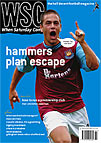 Jim Gwinnell takes a look at the best and worst moments in the long history of Bristol Rovers
Jim Gwinnell takes a look at the best and worst moments in the long history of Bristol Rovers
What has been the biggest single factor in Rovers’ recent decline?
There hasn’t been one single cause; the slump has had a number of different stages, with a cause for each. Throughout, the board and the four managers utilised have shown poor judgement, although most if not all their decisions were made in good faith. However, we’ve used more players than David Lean used extras in an epic, and most have not performed.
Has Ray Graydon been able to make much of a difference since his arrival?
Nothing tangible yet, but he is trying as hard as he can. Everyone who could be was shipped out in the summer, and a smaller group of new signings (loans, frees etc) brought in to mould from scratch. There have been flashes of promise (5-2 against Shrewsbury, for example), but apart from that we’ve struggled to find any form. It will happen eventually, it’s got to, and most people are willing to stand by Graydon until it does.
Has playing at the rugby ground had a serious effect on the club’s crowds?
It’s difficult to really compare the crowds at Eastville and at the Memorial Ground, as we spent ten years at Twerton in Bath and the final years at Eastville were spent in a fire-damaged stadium. The Mem is just up the road from Eastville (now Ikea), so location isn’t really an issue. We’re not filling it, but the crowds are still around the 6,000 mark.
What was your best ever moment as a Rovers fan?
I missed the May 2 promotion derby victory in 1990 (in fact I’ve never seen us beat City; just call me Jonah), and both Wembley trips failed to live up to expectation, so I’ll go for the 1992 FA Cup games against Liverpool. At the Anfield replay we went into half-time comfortably in the lead (well, 1-0). Then Steve McManaman took us apart. Twice.
You can’t go wrong with blue and white quarters – or can you?
You’d have thought not. However, our return to Bristol in 1996 was blighted by blue and white striped quarters. Nobody liked them and it was quickly dubbed the “Tesco bag” kit.
Fondly remembered
Geoff Bradford ~ There can be only one choice, even for those of us who never saw him play. In a 15-year one-club career he played 511 games, scoring 260 goals, and is the only player capped for England while at the club (one cap, one goal, yet never given another chance). We shall not see his like again.
Best forgotten
The whole team 2000-2002 ~ For all the mistakes of the board and the managers, they aren’t the ones on the pitch. There were too many players in the squad from 2000 to 2002 that didn’t deserve anything from Rovers, let alone their inflated wages. To call them Rovers players would be to betray all those that had preceded them.
Milestones & Millstones
1883 The Black Arabs form in East Bristol, before changing their name to Eastville Rovers, Bristol Eastville Rovers and, in 1898, Bristol Rovers.
1899 Join the Southern League, becoming champions in 1904-05. Leave to join Third Division South in 1920.
1940 Sell Eastville to the Bristol Greyhound Company, due to financial difficulties.
1950-51 Reach the FA Cup sixth round, losing to eventual winners Newcastle United in a replay. Huddie Leadbetter song Goodnight Irene becomes popular.
1952-53 First promotion to Second Division.
1972 Win the Watney Cup, beating Sheffield United on penalties.
1973-74 Promoted to Second Division again.
1986 Five years after relegation from the Second, rent increases and financial difficulties force Rovers to leave Eastville for Bath City’s Twerton Park.
1990 May 2 is the most famous date in Rovers’ recent history: a 3-0 win over City at Twerton clinched automatic promotion to Second Division. Also first trip to Wembley, losing 2-1 to Tranmere in Leyland Daf Cup.
1995 Lose second Wembley game, a play-off final, 2-1 (again) to Huddersfield.
1996 Return to Bristol, as tenants (now owners) of Bristol Rugby Club.
2000 Automatic promotion to First Division seemed a formality with ten games left; by the end of the season we were seventh and out of the play-offs. Two years later, our first season in Division Three saw us finish in 91st place.
From WSC 192 February 2003. What was happening this month